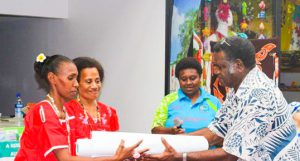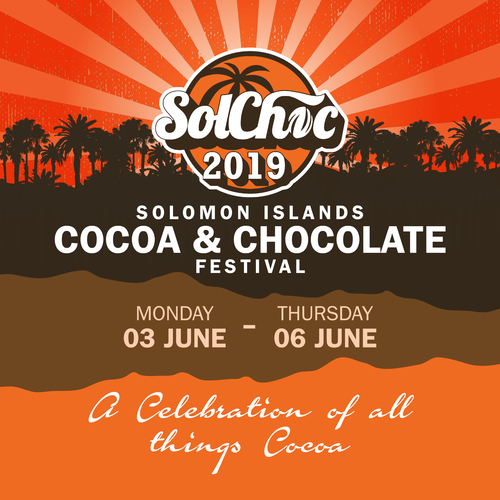Vanuatu’s ‘mamas’ poised to boost handicraft sales to tourists
 Vanuatu’s handicraft ‘mamas’ will soon benefit from information guides and posters developed by PHAMA in partnership with Biosecurity Vanuatu.
Vanuatu’s handicraft ‘mamas’ will soon benefit from information guides and posters developed by PHAMA in partnership with Biosecurity Vanuatu.
The practical guides and posters were launched by Vanuatu’s Deputy Prime Minister, the Hon. Ham Lini Vanuaroro, at a recent event in Port Vila attended by local tourism industry representatives and the Australian and New Zealand High Commissioners.
Tourism is a key part of Vanuatu’s economy, and the industry continues to grow, particularly the cruise ship sector. Each year over 250,000 tourists arrive by cruise ship, with strong projections for future growth. Vanuatu’s handicraft ‘mamas’ benefit from this tourism. However, limited information on the quarantine risks of the handicrafts (made predominantly from raw materials) and poor labelling often deters tourists from buying products.
The guides show the ‘mamas’ which handicraft materials are more likely to be carrying pests and how to detect them, and provide advice on how such pests can be killed using simple techniques. They also describe species, such as shells, which are protected by the International CITES* convention, and should not be sold.
The posters are targeted at tourists, notably cruise ship passengers, and aim to show them that, despite strict biosecurity rules, tourists can often take handicraft products home to Australia and New Zealand without issues.
According to the Deputy Prime Minister, the recent production and launch of handicrafts information is greatly appreciated and supported by Vanuatu’s government.
“This is a much-needed boost for the ‘mamas’ following the devastation wrought by Cyclone Pam,” said the Hon. Ham Lini Vanuaroro.
“Together with local tourism industry partners, our government will ensure that the new information is utilised by vendors to encourage tourists to buy our handicraft products.”
Also speaking at the launch, New Zealand High Commissioner, HE Georgina Roberts noted New Zealand’s support for Vanuatu’s tourism industry and acknowledged its potential to help improve livelihoods.
“The sale of quality, reliable handicrafts is a way of ensuring money from tourism stays within Vanuatu,” said Georgina Roberts.
“This is an industry that operates across the outer islands and influences the livelihoods of many Vanuatu people. It is vital that Vanuatu’s ‘mamas’ can speak with confidence to tourists about their products and maximise sales.”
Department of Foreign Affairs and Trade (DFAT) representative, Jennifer Kalpokas-Doan, noted the opportunity for Australia to help Vanuatu’s handicrafts industry link into the lucrative cruise line industry.
““Beyond the information and training that will be provided to ‘mamas’, through DFAT, Vanuatu will also be able to utilise Australia’s partnership with cruise line company, Carnival Australia, and promote their unique handicrafts to tourists on board cruise ships,” said Ms Kalpokas-Doan.
PHAMA Vanuatu National Market Access Coordinator, Leith Veremaito, emphasised the partnership with Biosecurity Vanuatu and TAP.
“While PHAMA has produced these materials, they still need to be distributed across Port Vila and other tourist locations and backed up by training with the help of Biosecurity Vanuatu and TAP,” said Mr Veremaito.
Contact:
Mr Leith Veremaito
PHAMA National Coordinator in Vanuatu
Phone: +678 7101141/25229
*CITES (the Convention on International Trade in Endangered Species of Wild Fauna and Flora) is an international agreement between governments. Its aim is to ensure that international trade in specimens of wild animals and plants does not threaten their survival.
Image: The Hon. Ham Lini Vanuarogo presents two of Vanuatu’s ‘mamas’ with newly-released information guides and posters designed to help them better tap into tourism markets.

